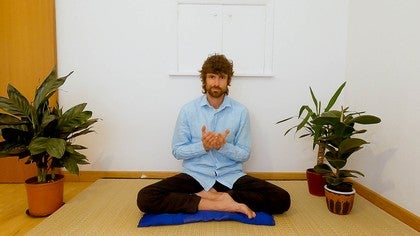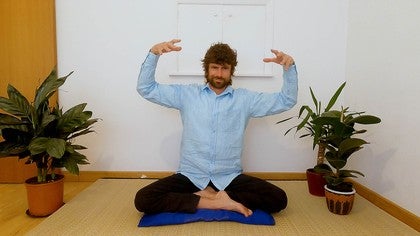Description
About This Video
Transcript
Read Full Transcript
Sutra 45 now potentially turns to the culminating, Niyama, Ishweta Pranitana. Now, I mentioned before that whenever we have groups or lists, in a text like the August Sothran. The 1st and the last members of the group are usually of his special importance. So we had Ahintza. We mentioned it's the governing Yama.
All of the other James and Niyamas are for the sake of supporting Ahintza. And here at the end, we have Ishweta Pronetana. And in chapter 1, Potanha has already mentioned that Ishweta Pronetana in and of itself is one of is a means to actually bring about the experience of yoga. And here, remember chapter 1 was called Samadhi party. It's all about the cultivation of Samadhi, and Samadhi and yoga are synonyms.
So here potentially says samari from ishweta Pranitana, the city, the perfection or the realization of Samadhi? What does it mean that perfection of Samadhi? So summer means evenness. In chapter 1, when potentially speaks about the successive deepening and becoming more refined and subtle of those the different stages and states of Samadhi. He talks about how the subject, the object, and the seeing, or the thing between them, gradually become 1. So this is the perfection of Samadhi, where it's like, here we are folks. Say, for example, I'm focusing on the object of meditation.
And I'm aware of myself and the object and that I'm focusing But as Samadhi becomes more and more fully realized, the split differentiation between the subject, the object, and the means of perceiving, are focusing, they start to merge until there is a state of in the language of potentially Kevalya, all oneness. And so then, the Samadhi becomes, without differentiation, and we're just fully absorbed, and the light of awareness is all 1. Botanically says from the practice, from the cultivation of Ishwadapronidana, this supports and brings about and facilitates and makes more readily accessible this realization, this fullness, this culmination, this perfection of Samadhi. How Well, each what I've currently valued, it means offering my actions to something greater than myself. So this means taking responsibility for what I do to the degree that I'm then able to offer it. So practicing Ishweta Prani Dhan, we could say it means practicing making myself a channel through which an energy greater than me can flow.
So that word flow if one sees a master at work in a particular field, it could be somebody fixing, you know, like a craftsman fixing a door that's broken. It could be a musician playing. It could be somebody doing some tasks that they're very skilled at. But we see skillfulness, beauty, grace intelligence flowing through their action, and it's quite something to behold. Similarly, the person who comes to that state, how did they get there?
For example, if one watches a great tennis player, like Rafael Nadal or Roger Federal, Novak Jokovic, for example, they can demonstrate that state of flow. So James. They can be play they can be in the zone, and they're doing incredible things on the tennis court, but how did that happen? They worshiped tennis for a long time, and they still do. And that's why they are able to become a channel or vehicle for the gods of tennis to vibrate through them and allow them to paint this big guiling spectacle that a whole arena can be mesmerized by, if that makes sense. They put in a lot of work dedicating themselves to that craft.
Similarly, When we dedicate ourselves to the craft of living yogaically, of living in that skillful, balanced way, that invites the grace of an energy that's faster than us to infuse our day to day actions. There's the idea that steadily we will, as it were, pray to the gods of yoga in the sense that we orient our systems. To pray in the Sanskrit means to orient towards the means. So if I want peace, it means let me practice peace. Let me enact embody peace.
If I'm to do that, it means I need to make my actions and offering 2 peacefulness. So when I make what I'm doing and offering to something higher than myself, it's like I practice getting out of my own way. And when I get out of my own way, I leave so much more of my awareness available to become connected and joined to what I am engaging with. So this fusion, this unification of the subject and the object, this absorption in what I'm doing becomes much more readily available to me. And as it does, I start to attune my system to the savor and the richness of that deeper, more integrated, more congruent experience. So Ishwada Prani Jani, consecrating my actions. As I do that, if we think of consecration and sanctifying.
It's very interesting that the word sanctify tracing it back etymologically to the Sanskrit comes from the verb us, which gives us the word center and the saint. It means one who is present. So as we practice making our actions offerings, It's a very powerful practical way to train us to make our actions the fruit of a deeper presence. And in that deeper presence, we can access, we can move into a deeper state of Samadhi and a deeper state of yoga.
Yoga Sutras of Patanjali: Yamas and Niyamas
Comments
You need to be a subscriber to post a comment.
Please Log In or Create an Account to start your free trial.












